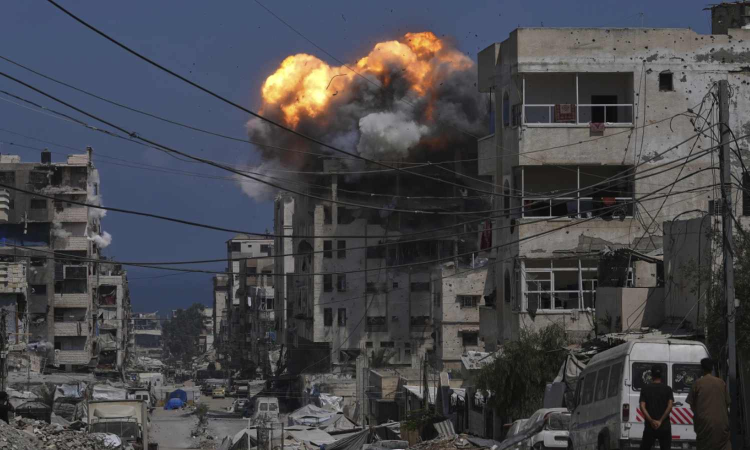Clever politics: Saying aye to Palestine
Both announcements reflect the deep frustrations of both nations with Israel’s conduct of the war in Gaza, analysts say, which has killed tens of thousands of Palestinians and left a population of about 2 million in a state of hunger

Israel War (AP)
Britain on Tuesday said it would recognise a Palestinian state if Israel did not reach a ceasefire agreement on the war in the Gaza Strip by September. Prime Minister Keir Starmer’s move followed France’s announcement last week that it would officially acknowledge statehood for Palestine.
Both announcements reflect the deep frustrations of both nations with Israel’s conduct of the war in Gaza, analysts say, which has killed tens of thousands of Palestinians and left a population of about 2 million in a state of hunger.
They also came in response to Israel’s actions in the occupied West Bank: Its military activity there has displaced Palestinians en masse, settlement plans have expanded, and violence by settlers against Palestinians has risen since the Hamas-led Oct. 7, 2023, attack on Israel ignited the war. That assault killed about 1,200 people and led to the abduction of about 250 others to Gaza.
The announcements raise questions about what the recognition of a Palestinian state would mean and what it can do.
The criteria for statehood were laid out in an international treaty in 1933.
They include four elements: a permanent population, defined territorial boundaries, a government and an ability to conduct international affairs.
Recognition is an official acknowledgement that a would-be state broadly meets those conditions. It can occur even if an element is in dispute, including territorial boundaries.
Like all legal questions, “interpretation matters,” said Zinaida Miller, a professor of law and international affairs at Northeastern University.
The criteria for recognising a Palestinian state have been met at a basic level, many experts on international law say.
A permanent population and land exist. The borders, while disputed, are broadly understood to be in Israeli-occupied territories, including the West Bank and the Gaza Strip, which were seized in 1967 in a war with a coalition of Arab states; as well as East Jerusalem, which Israel has effectively annexed.
The Palestinian Authority is a government body that administers part of the West Bank and represents Palestinians. Its creation was authorised by the Palestine Liberation Organisation, which represents Palestinians internationally.
While there are limits to what the Palestinian Authority can do, given the Israeli occupation of the West Bank and Hamas’ control of Gaza, foreign recognition of a Palestinian state would mean the establishment of direct diplomatic contact between the authority and the recognising nation.
Recognition would also send diplomatic and political messages. It would acknowledge the Palestinian right to self-determination and reject the positions and actions of the Israeli government that undermine that right, Miller said.
A major consequence of recognising Palestinian statehood is that it provides a basis for “a complete revision of bilateral relations with Israel,” said Ardi Imseis, an associate professor at Queen’s University Faculty of Law in Ontario and a former United Nations official.
A country that recognises Palestine has to review agreements with Israel to make sure they do not violate its obligations to the Palestinian state. This would include political and territorial integrity, as well as economic, cultural, social and civil relations, he said.
For example, if an aspect of trade aids or assists Israel in violation of the rights of the Palestinian state, then the recognising nation would have to cease that exchange.
A recognising nation would not have to stop all trade with Israel, said Paul Reichler, a lawyer who represents sovereign states and has argued for the state of Palestine at the International Court of Justice.
But if, for example, a country that recognises a state of Palestine imports agricultural products from farms belonging to settlers in occupied territories, those agreements would be aiding and abetting the commission of a wrongful act, he said.
International law experts note that an advisory ruling from the International Court of Justice last year concluded, among other things, that the Israeli occupation of Palestinian territories violated a prohibition on territorial conquest.
Most countries in the United Nations — 147 out of 193 — already recognise a Palestinian state.
Britain and France would be joining them, and their position has extra heft because they are permanent members of the UN Security Council, with the power to veto any substantive Council resolution, including on the admission of new member states.
The two countries would be bolstering the stance taken by most other nations and sending a political message, but their shift would also have a practical effect. They would join China and Russia in recognising a Palestinian state and leave the US as the sole permanent member of the Security Council with veto power that is holding out.
The state of Palestine currently has observer status at the UN, and that will not change if the US maintains its opposition to full membership.
The New York Times



